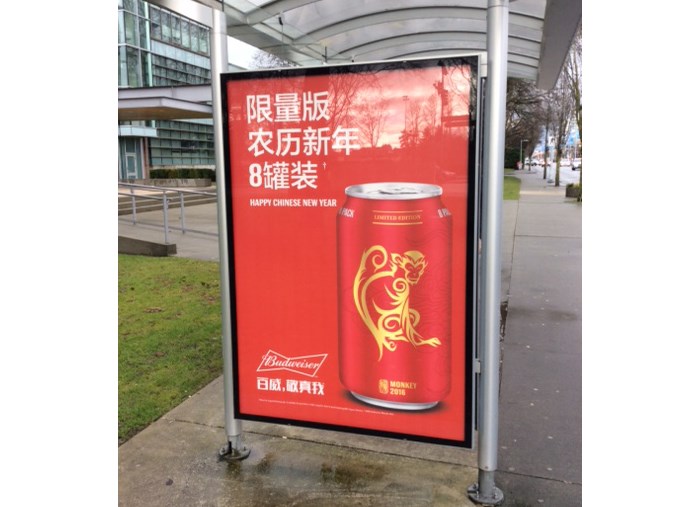Bus stops in Richmond now have a new requirement: English.
Mayor Malcolm Brodie said a new, 20-year contract with Pattison Outdoor Ltd. that stipulates English must be featured prominently — or at least 50 per cent — on any bus stop advertisement on City of Richmond property is “commensurate with communicating with the whole population.”
Pattison, as a contractor, will procure bus stop ads on shelters and benches, with the municipality taking a portion of the profits.
The newly signed agreement notes:
“The Contractor agrees that it will require that any advertising with a foreign language must include a minimum of fifty (50%) per cent English in terms of overall space, font size, content, and level of detail. In the event that this requirement is not complied with or is challenged, the Contractor will refer such matter to the City for approval of the language ratio proposed.”
While the new requirement was not stated explicitly in any public report to city council, Brodie said city staff was directed by councillors to make English mandatory.
When asked why English ought to be required at bus shelters, Brodie said it made sense as English was the language of the majority.
The city contends it can regulate ads on its property but not on private business signs; last year, council decided not to create a sign bylaw to enforce English, following public concerns over Chinese-only signage. It instead chose to temporarily hire a bylaw officer this year to conduct consultation with predominantly Chinese-speaking businesses.
The city’s new contract is in stark contrast to TransLink’s insistence that it cannot regulate language on ads on TransLink property, such as at Canada Line stations and on the back of buses, both of which have prominently featured Chinese-only real estate and retail ads.
TransLink, according to a spokesperson, could place language requirements in its advertising policy, however it may be subject to a court challenge, and thus the public transportation agency would need to prove, under Section 1 of the Charter, that there are demonstrably justified reasons to limit freedom of expression.
Similarly, city council was advised that it could create a language bylaw for business signage, however, it was a matter of whether or not it could be proved that the English requirements were a reasonable limitation on the Charter (specifically, whether a predominance of signs in an non-official Canadian language are harmful to community harmony) should the bylaw be challenged in court.
Since 2012, the city noted just 4.5 per cent of regulated signs were non-English. However, to be considered bilingual a sign needn’t be 50 per cent English — but rather simply have some English on it.
As of January 2015, there were 365 bus stop benches and 54 shelters on city property, the vast majority of which are privately owned. In 20 years-time, the city expects to have about 600 benches and 250 shelters.



